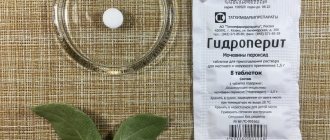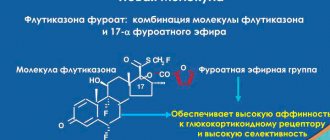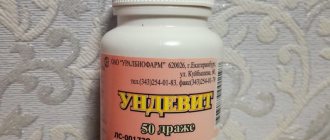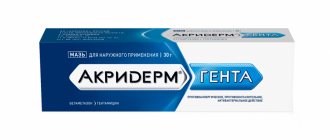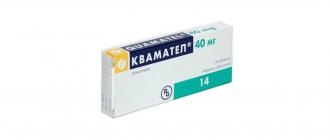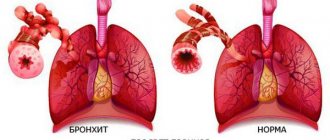Disturbances in the functioning of the child’s urinary system indicate the possible development of cystitis. The cause of the disease is infection by bacteria that enter the bladder. Due to the anatomical features of the reproductive system, girls are most susceptible to cystitis. Provoking factors that cause the inflammatory process are hypothermia of the body and decreased immunity. You should not postpone a visit to the doctor if you suspect a disease. The earlier treatment is started, the more successful it will be. Along with antibiotics, the drug Phytolysin is often prescribed. It has a completely natural composition. Enhances the therapeutic effect of medications without causing harm to the child’s body. Phytolysin is prescribed to children at any age.
The earlier treatment is started, the more successful it will be.
What is Phytolysin
The drug is a viscous pasty substance of greenish-brown color with a characteristic mint aroma and herbal taste. Its base: a mixture of powdered medicinal plants:
- parsley root;
- birch leaves;
- fenugreek seed;
- wheatgrass root;
- goldenrod;
- knotweed;
- onion peel;
- lovage root;
- horsetail.
Essential plant oils are used as additional therapeutic ingredients: citrus, pine, mint and sage. The binder components of the product include glycerin, agar, starch and water.
Fitolysin paste is packaged in metal tubes with a capacity of 100 ml. Intended for oral use - inside.
Phytolysin 100g paste for the preparation of suspension for oral administration
pharmachologic effect
Diuretic of plant origin.
Composition and release form Phytolysin 100g paste for the preparation of suspension for oral administration
Paste for preparing the suspension - 100 g:
- condensed extract of the mixture: goldenrod herb, horsetail herb, knotweed herb, wheatgrass rhizomes, onion peels, birch leaves, fenugreek seeds, parsley root, lovage root - 67.2 g;
- active oils: orange oil - 150 mg; sage oil - 1 g; peppermint herb oil - 500 mg; Scots pine oil - 200 mg;
- Excipients: agar-agar - 1.2 g, ethyl parahydroxybenzoate - 0.2 g, wheat starch - 2.3 g, vanillin - 0.0004 g, glycerol (glycerin) - up to 100 g.
100 g - aluminum tubes (1) - cardboard packs.
Description of the dosage form
Paste for preparing a suspension for oral administration, green-brown in color, soft consistency, with a specific odor.
Directions for use and doses
Adults are prescribed 1 teaspoon of paste orally, dissolved in 1/2 glass of warm sweet water, 3-4 times a day after meals.
The duration of therapy is determined by the doctor. The average course of treatment ranges from 2 weeks to 1.5 months. Increasing the duration of treatment is possible as prescribed by a doctor.
Pharmacodynamics
Combined herbal preparation with diuretic, anti-inflammatory, antispasmodic effects. Promotes the washing out of sand and small stones from the urinary tract, reduces the crystallization of mineral components of urine.
Pharmacokinetics
No data available.
Indications for use Phytolysin 100g paste for the preparation of suspension for oral administration
- infectious and inflammatory diseases of the urinary tract (as part of complex therapy);
- nephrourolithiasis (as part of complex therapy).
Contraindications
- renal failure;
- heart failure;
- glomerulonephritis;
- phosphate urolithiasis;
- age under 18 years;
- hypersensitivity to the components of the drug.
Application of Phytolysin 100g paste for the preparation of suspension for oral administration during pregnancy and breastfeeding
Due to the lack of data regarding the teratogenic effect of the components of the drug, it is not recommended to use the drug during pregnancy and lactation.
Contraindicated in children and adolescents under 18 years of age.
special instructions
The drug should not be used if edema occurs due to insufficient cardiac or renal function.
Impact on the ability to drive vehicles and operate machinery
The use of the drug does not have a negative effect on the ability to perform potentially hazardous activities that require increased concentration of attention and speed of psychomotor reactions (including driving a car and other vehicles, working with moving mechanisms).
Overdose
To date, no cases of overdose have been reported.
Side effects Fitolysin 100g paste for the preparation of suspension for oral administration
Allergic reactions are possible, and sometimes nausea.
With increased sensitivity to ultraviolet rays, photosensitivity phenomena are possible.
If side effects occur, the drug should be discontinued.
Drug interactions
Due to the diuretic effect of the drug, the possibility of accelerated elimination of other simultaneously used drugs should be taken into account.
Phytolysin® may enhance the effect of anticoagulants, NSAIDs, hypoglycemic agents, drugs containing lithium salts, and MAO inhibitors.
Phytolysin® can prolong the effect of pentobarbital and paracetamol.
Phytolysin® can reduce the absorption of drugs in the small intestine, incl. β-carotene, α-tocopherol.
What is Phytolysin used for?
Phytoncides, alkaloids, saponins, minerals and other active substances provide the medicinal properties of the drug. It has a pronounced anti-inflammatory, astringent and diuretic effect, reduces pain, physical discomfort and other symptoms of cystitis. As a result of using Phytolysin:
- excess sodium and chlorine are eliminated from the body;
- glomerular filtration is activated;
- the proliferation of pathogens in the urinary tract is blocked;
- uric acid levels decrease;
- the effect of ascorbic acid and antioxidants is prolonged;
- the removal of sand and small stones from the kidneys is accelerated, and another attack of urolithiasis is prevented.
The drug helps restore well-being in acute and chronic inflammation. Including:
- urethritis, cystitis;
- pyelitis;
- deposition of urinary stones;
- dysfunction of the kidneys and urinary tract due to surgical operations.
There is a therapeutic effect of diuretic paste for oxalate kidney stones: their loosening and removal of sludge naturally with regular use of the medicine.
Contraindications
The pronounced diuretic effect of herbal components excludes the use of the drug in patients with the following conditions:
- Jades.
- Kidney failure.
- Presence of phosphate stones in the kidneys.
- Nephrosis.
- Diseases of the digestive system (gastritis, ulcers, pancreatitis).
- Hepatitis, cholelithiasis, cirrhosis.
Phytolysin should not be taken if you are sensitive to any component of its composition.
Due to the ability of the drug to enhance or weaken the effect of other medications, special care must be taken when combining. Phytolysin enhances the healing properties of paracetamol, anticoagulants, and other substances. The absorption of carotene and tocopherol when used together is reduced.
The advantage of herbal medicines is that they are unlikely to cause negative effects when used. They occur in rare cases, usually being the result of individual sensitivity to one of the components of the drug. The instructions for use warn of side effects, expressed as an allergic reaction, accompanied by the appearance of a rash on the skin, itching and burning. Sometimes nausea, diarrhea, vomiting, decreased sensitivity of taste buds, photosensitivity (increased sensitivity to sunlight) are possible. If such symptoms appear, stop using the drug.
Phytolysin does not affect the transmission of nerve impulses, therefore it can be used by people whose field of activity requires coordination of movements and reaction speed.
How to take Phytolysin correctly
For inflammation of the bladder, kidneys, urolithiasis and for the prevention of recurrent attacks, Phytolysin should be taken orally as a mixture:
- squeeze out about 1 tsp. funds in a glass;
- dilute with a small amount of water and drink;
- repeat taking the drug up to 4 times a day 1 hour after meals.
To soften the harsh taste of the medicine, you can add a little sugar, sweetener or honey to it.
special instructions
Herbal paste is not capable of acting as a monotherapy in the treatment of infectious diseases of the genitourinary system. Phytolysin, having a high ability to support antibacterial therapy, enhancing its effectiveness and safety, is used only in complex treatment. The drug should be taken as prescribed by a doctor and under his supervision. Uncontrolled use of the drug can lead to changes in the clinical picture, which will subsequently cause serious difficulties in drawing up a treatment regimen.
During the therapeutic course, you must adhere to a special diet that excludes foods that irritate the bladder mucosa (spices, smoked foods, carbonated drinks). You will have to limit your child’s consumption of sweets, especially chocolate. To maintain water balance in the body, you should give it more fluid.
Side effects of Phytolysin
In the absence of contraindications, the natural diuretic is well tolerated. Increased urination after taking the drug is normal. Occasionally, negative symptoms develop during treatment:
- decreased appetite;
- bitter taste in the mouth;
- nausea, vomiting, heaviness in the stomach;
- dizziness;
- decrease in blood pressure.
In the first few days, such manifestations are not a reason to discontinue the drug. If your health deteriorates further, you need to postpone therapy and consult a doctor.
Price for Phytolysin, where to buy
Phytolysin is not available in tablets. The price of the pasta is quite reasonable. The cost of the drug in Ukraine will be 68 UAH per tube, 100 grams.
How much does medicine cost in Kyiv? You can purchase the drug in the capital for 90 UAH per package (100 g).
- Online pharmacies in RussiaRussia
- Online pharmacies in UkraineUkraine
- Online pharmacies in KazakhstanKazakhstan
ZdravCity
- Phytolysin paste for preg suspension.
for internal approx. 100g Herbapol 499 rub. order - Phytolysin nefroCAPS capsules 356 mg 30 pcs. LLC "Gerbapol Warsaw"
472 RUR order
Pharmacy Dialogue
- Phytolysin paste tube 100gHerbapol
489 RUR order
- Phytolysin Nephrocaps (caps. No. 30)Herbapol
RUB 495 order
- Phytolysin Prenatal (capsule No. 36)Medana
415 rub. order
show more
Pharmacy24
- Phytolysin-Active No. 10 capsules 3i NATURE, France
136 UAH. order - Phytolysin 100 g paste TOV Herbapol Warsaw, Poland
151 UAH order
- Phytolysin N30 capsules TOV Herbapol Warsaw, Poland
165 UAH order
PaniPharmacy
- Phytolysin Phytolysin paste 100g Poland, Herbapol
163 UAH order
- Phytolysin Active caps. No. 10, Zee Nature
147 UAH order
show more
When Phytolysin is contraindicated
The components of the natural drug have a gentle effect on the body, but in some cases they can cause harm. Conditions under which Phytolysin must be discontinued:
- glomerulonephritis: a pathology in which glomerular tissue atrophies and kidney failure develops;
- hepatitis: all substances are metabolized in the liver, inflammation of its cells provokes the accumulation of toxins in the body;
- cholelithiasis: plants in the composition of Phytolysin promote active contraction of the walls of the bile ducts, this can lead to damage to the walls by stones or stone getting stuck;
- heart failure: the removal of electrolytes negatively affects the functioning of the myocardium and can provoke another dangerous attack;
- Gluten intolerance: wheat protein is contained in small quantities in the medicine;
- epilepsy: some compounds in the drug negatively affect the state of the central nervous system in this disease;
- phosphate kidney stones: the diuretic effect of the paste can cause severe colic or lead to stones getting stuck;
- individual hypersensitivity: the appearance of allergic itching, swelling or rash after taking a diuretic.
Pharmacological properties
Instructions for use describe the numerous possibilities of the drug. The effective action of Phytolysin is explained by a well-chosen complex of medicinal plants:
- Extracts of horsetail and knotweed give the drug diuretic properties. By increasing the daily amount of urine, they help flush out pathogenic bacteria from the urinary organs.
- The anti-inflammatory and analgesic effect is provided by the extract of bird knotweed and creeping wheatgrass. Acting on the mucous membrane of damaged organs, they reduce irritation and relieve swelling. The amount of protein in the urine decreases.
- The antiseptic effect is due to lovage, birch leaves, and goldenrod. Plants have high disinfectant properties.
Paste "Fitolysin"
Phytolysin relaxes the smooth muscles of the bladder walls, relieving spasms and eliminating painful symptoms. The drug is effective for hemorrhagic cystitis, providing a hemostatic effect. The extracts of the plants included in the composition accelerate the regeneration processes in tissues, allowing the affected mucosa to recover faster.
The components of the drug, which have a general strengthening effect, give it the ability to increase the body's resistance. Some of them dissolve small urinary stones that form in the kidneys, facilitating their removal from the body, and preventing subsequent formation.
Combining the complex effects of medicinal plants in one preparation speeds up the healing process for infectious diseases of the urinary organs.
